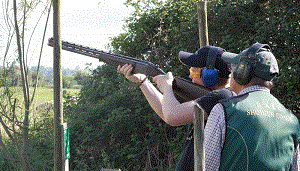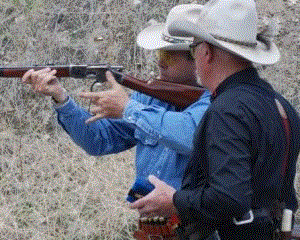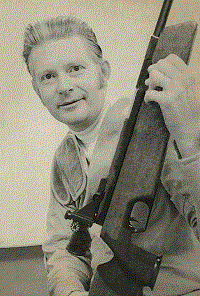 By George Emanuel
By George Emanuel
In a word, YES!
A training partner is a tool we should all have in our tool box. This can be anyone from whom you can take direction and constructive criticism when displaying your shooting abilities, or lack thereof for that matter. They likewise should possess the same qualities when you are coaching them.
A shooting, or more accurately a training partner, can be a real joy. Two of you on the range can learn much faster and a lot more a ccurately from each other than you will ever be able to do on your own. I don’t care who you are, or what you imagine your skill level to be! Can you be brutally honest with yourself? (It’s easy to cheat when no one is watching)
ccurately from each other than you will ever be able to do on your own. I don’t care who you are, or what you imagine your skill level to be! Can you be brutally honest with yourself? (It’s easy to cheat when no one is watching)
Do you habitually practice with a purpose?
Can you see all of your mistakes, and correct them? Or, do you keep making them and hope they go away on their own? I assure you they won’t mysteriously disappear. And yes, we all make them, even me.
In every class I teach, I try to employ a coach/pupil method. Even in the most basic classes, I do this to re-enforce the lessons. You see there is a little-known secret in all things. You can improve your own performance by watching the mistakes of others, or the things that others do correctly when you don’t do them yourself. If you don’t believe this, ask yourself, “if I don’t learn by watching others, why am I spending all of this time on the internet watching videos?” I don’t care how many times you watch Rob Pincus, Adam Painchaud, Jerry Miculek, Rob Leatham, or Jeff Gonzales, while these are all great shooters, and pretty darn good teachers, they are on a screen and can’t see you when you are shooting. They can show you, but they can’t train you!
Even when you are in a class with a great trainer and his assistants they are likely not watching your details 100% of the time as each shot is sent down range. They have other students in the class as well as you. But a training partner is eating every bit of brass you fire as you practice. Because he should be right there at your ejection port, watching every facet of your shooting, and offering suggestions for improvement.

When coupled with attending training where techniques are taught by qualified instructors you and your training partner learn the material together and may thereafter visit the range to verify that you are honing those techniques properly.
Your training partner can also load your magazines, set up misfeeds, run the timer, and guard your lunch. (or buy it). In short, you swap admin duties to facilitate the reaction to the unknown and add a little more realistic stress.
No instructor will tell you that you have mastered a technique in class, I don’t care how complementary they are about your comprehension or execution. You master a technique when you are no longer conscious of performing it. It is just that simple. You must develop the neural pathways to perform the task without consciousness. This has been compared to an out-of-body experience. (When you have your first one you will know exactly what I mean.)
A little story to drive this home.
Gary Anderson was an Olympic Marksman in the sixties. He had more gold around his neck than the Comstock Lode produced. He was interviewed by, I believe, Sports Illustrated. The interviewer was totally unprepared for the answer Gary gave him to what he thought was a very insightful question. “Gary, what goes through your mind as you fire each shot?” The answer was, “Nothing” He likely, like many of us, felt afterward as though he had been watching someone else shooting.

I can only imagine the interviewer’s face and body language when he heard that answer. But, Gary Anderson had honed his skills to that very fine point where he simply “performed”. He had done his thinking about his techniques over the many years it took him to hone them! He didn’t need to think about them with each shot!
So yes, you need a training partner. Someone to take classes with and to reinforce what you learned from your instructor. Someone who will not allow you to “cheat” yourself, and someone who will expect you to reciprocate.
As you practice with your partner, you will enjoy the experience more. It is harder to say I’ll go to the range tomorrow when you know someone else is counting on you today. And by the way, if it rains, stay inside ‘dry fire’. Or alternatively, “man up” and get wet together! You may not start out as friends, but you will become one and gain one as well.
A training partner is a win, win, win!